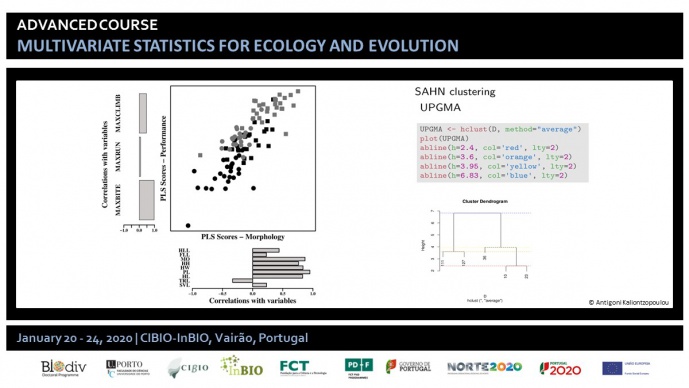Multivariate statistics for Ecology and Evolution

Many of the questions concerning the fields of ecology and evolution are better represented by multivariate datasets. The complex relationships observed across an ecological community, the association among different sets of phenotypic traits and the interaction between the phenotype and its environment are all fundamental questions in evolutionary ecology. The description and comprehension of complex traits is often better achieved through the quantification and analysis of multiple, frequently interdependent, phenotypic and ecological variables. The R-language for statistical computing has been increasingly used by evolutionary ecologists for statistical inference and hypothesis testing. Being a comprehensive statistical package with excellent graphical capabilities and freely available, it has become an indispensable tool in ecological and evolutionary studies: many new statistical methods have been developed in recent years using R and numerous top-rank journals nowadays favor its use for the publication of scientific results.
This course is directed towards PhD students interested in exploring the potential of R language for multivariate analyses in ecology and evolution. The course will provide a general presentation of major statistical tools for multivariate analyses, including e.g. exploratory methods, multivariate GLM, methods for controlling for evolutionary and ecological non-independence, and it will provide the participants with the skills for implementing these tools using R.
A good knowledge of basic operations in R (file import, handling objects, using functions, getting help) is required and assumed to be able to adequately follow this course. BIODIV students are encouraged to take the Introduction to R course first.
PROGRAMME
The course will include theoretical and practical sessions. During theoretical sessions, the instructors will discuss major themes in ecology and evolution and associate them to the statistical tools available for exploring specific scientific questions. Practical sessions will include practical training by the participants using build examples provided in the form of R code, as well as problem solving of questions related to the theoretical topics of the day.
At the end of the course, participants will be required to give a presentation on an example dataset, including some analyses carried out during the course, and/or ideas of how they might incorporate the knowledge acquired during the course to their research.
Monday
09:30 – 11:00 | Preliminary concepts:
Why bother with multivariate analyses?
How do we do this?
Review of matrix algebra.
What's in a distance: multivariate data spaces and metrics
11:30 – 13:00 | Exploratory Methods:
PCA, PCoA, MDS
14:00 – 15:00 | Review of programming and the R environment
15:00 – 17:30 | LAB
Tuesday
09:30 – 11:00 | Inferential Methods I:
Resampling (randomization, bootstrap, jackknife, Monte Carlo statistics)
11:30 – 13:00 | Inferential Methods II:
MANOVA
14:00 – 15:00 | Inferential Methods III:
regression & MANCOVA
15:00 – 17:30 | LAB
Wednesday
09:30 – 11:00 | Methods for evolutionary and ecological non-independence (GLS)
11:30 – 13:00 | GLMs and ordination methods for non-continuous data
14:00 – 15:00 | Model selection (likelihood, AIC, BIC)
15:00 – 17:30 | LAB
Thursday
09:30 – 12:00 | Association Methods:
PLS, CanCor, Mantel tests, CVA
12.00 – 13:00 | Clustering
14:00 – 17:30 | LAB
Friday
Student presentations
COURSE INSTRUCTORS
Antigoni Kaliontzopoulou - CIBIO | PHENEVOL
Pedro Tarroso - CIBIO-InBIO | BIODESERTS
Jesus Muñoz-Pajares - CIBIO-InBIO | PLANTBIO
INTENDED AUDIENCE
The course will be open to a maximum number of 20 participants.
SELECTION CRITERIA
75% of available student slots are reserved for BIODIV students.
Priority will be given to:
• 1st year and other PhD students attending the BIODIV Doctoral Program;
• PhD students attending other courses;
• Other post-graduate students and researchers.
REGISTRATION
Participation is free of charge for BIODIV students | 95 € (students) | 200 € (other participants). CIBIO-InBIO members will have an additional discount of 20%.
Registration deadline: November 25, 2019
All applicants will be notify about whether they are accept until December 02, 2019
Please note that new rules apply for all BIODIV students.
